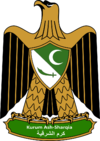Islamic Diwan of Kurum Ash-Sharqia: Difference between revisions
From MicrasWiki
Jump to navigationJump to search
(image) |
(→Membership: corr) |
||
| Line 84: | Line 84: | ||
The Islamic Diwan has two categories of members: | The Islamic Diwan has two categories of members: | ||
* ordinary members are appointed by Al-Majlis Al-Watani at the [[Grand Vizier of Kurum Ash-Sharqia|Grand Vizier's]] proposal, at least half of the ordinary members need to be Muslim by faith, they have full voting rights | * ordinary members are appointed by Al-Majlis Al-Watani at the [[Grand Vizier of Kurum Ash-Sharqia|Grand Vizier's]] proposal, at least half of the ordinary members need to be Muslim by faith, they have full voting rights | ||
* co-opted members are co-opted for their knowledge or expertise by the ordinary | * co-opted members are co-opted for their knowledge or expertise by the ordinary members, they have no voting rights | ||
Revision as of 19:08, 1 March 2023
| Islamic Diwan | |
| History | |
|---|---|
| Founded | 1700 AN |
| Structure | |
Political groups |
Ordinary members Co-opted members |
| Meeting place | |
| Vrijplaats | |
- This article is for the Islamic Diwan of Kurum Ash-Sharqia. For other similarly-named entities, see Islamic Diwan.
The Islamic Diwan of the Sultanate of Kurum Ash-Sharqia is the so called "advisory branch", next to the legislative, executive and judiciary branches of government. It is governed by chapter 6 of the constitution, which draws heavily from the constitution of New Batavia.
Before a law is passed by Al-Majlis Al-Watani, it needs the advice of the Islamic Diwan, although this advice is non-binding.
Membership
The Islamic Diwan has two categories of members:
- ordinary members are appointed by Al-Majlis Al-Watani at the Grand Vizier's proposal, at least half of the ordinary members need to be Muslim by faith, they have full voting rights
- co-opted members are co-opted for their knowledge or expertise by the ordinary members, they have no voting rights
| |||||||||||||||||||||||||||||||||||||||||

